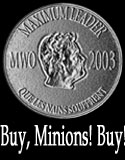Greetings, loyal minions. Your Maximum Leader was reading over a comment from the Minster of Propaganda. The M of P left the following comment in response to a (lame) post of your Maximum Leader’s concerning North Korea:
I’ll put forward that we’ve been making plans to invade North Korea ever since the Bush administration started floating the idea of withdrawing our troops from South Korea last year.
The defense of South Korea against a Northern invasion is not feasible; the only wartime mission for our forces in Korea, for all practical purposes, is — with their destruction — to trigger a U.S. re-invasion. By minimizing our forces on the ground, we are minimizing our vulnerability to counterstrike should we exercise a first-strike option.
Whether or not this is a good strategy for the U.S. to adopt is a matter of opinion and debate.
Your Maximum Leader will agree with the Minister of Propanganda in almost every point he makes in this comment. Your Maximum Leader agrees that the Bush Administration has been making up various plans concerning how to deal with North Korea militarially. He will go one step further and say that he is confident that the Pentagon as made such plans for every administration since John F. Kennedy’s.
He also agrees that US troops are “tripwire” troops. Their only purpose on the Korean penninsula is to be destroyed in the event of a North Korean invasion. The destruction of US forces will, in turn, provoke a full US response.
As the M of P stated, a successful defence of South Korea - or at least one in which most of the country is not completely overrun by the North - is not feasible. Indeed, if every analyst’s opinion is accurate on this issue, Seoul would be destroyed within a matter of minutes. If US forces remained in the vicinity of Seoul and the DMZ their only purpose would be to die doing what they could to defend Seoul.
The Bush Administration has suggested, for a number of reasons - not the least of which is pressure from the South Koreans, to move US forces much farther south on the penninsula. This would, ostensibly, improve their chances of survival. (It would also free up lots of prime Seoul real estate, but that is another matter.) But would the forces then be “tripwire” forces? Presumably, by moving US troops further south the surviability of those troops is increased. But if the troops are no longer in a position to be the “tripwire,” what exactly is their role?
Therein is the crux of the national debate we are not having. What is the US role in guaranteeing a free So�th Korea? Does South Korea need the US as the guarantor of its freedom?
There is something particularly unsavory in maintaining tripwire forces. The force has to be significant enough to be a meaningful presence. That is to say that the number of troops have to be great enough to provoke outrage at their death at the hands of the enemy. Of course, the force is not so large as to have a legitimate chance of long-term survival.
This has been, since the end of the Korean War, the policy of the US government.
Adding to the unsavory proposition of positioning US forces solely to have them destroyed is the growing feeling among South Koreans that US troops be withdrawn. South Korea is, afterall, a reasonably prosperous nation that appears able to defend itself. So why not let them defend themselves?
Indeed, your Maximum Leader believes that with the changing world situation the US needs to withdraw its troops and close its existing bases throughout most of continental Europe. What then might make Korea different?
Perhaps it is the nature of the North Koreans. When your Maximum Leader plays word association with someone and they say “rouge state” he thinks “North Korea.” Almost instantaneously. The North Koreans, unlike Syrians, Iranians, or any other state you’d like to throw into that mix, are certifiably insane. That insanity deserves a certain degree of engagement. Because if left unchecked it we’ll end up with a group of starving insane people with nuclear missiles aimed at Los Angeles and Seattle.
Perhaps we do (and should) feel partially responsible for the situation on the Korean penninsula and want to see it through to some sort of conclusion?
Regardless of what precisely might make Korea a different sitation from Germany we do need to rethink our role there. If our forces aren’t stationed directly (and immediately) in harm’s way what is their purpose? If we can’t well answer that question it woud seem as though we need to remove our troops all together.
Carry on.




